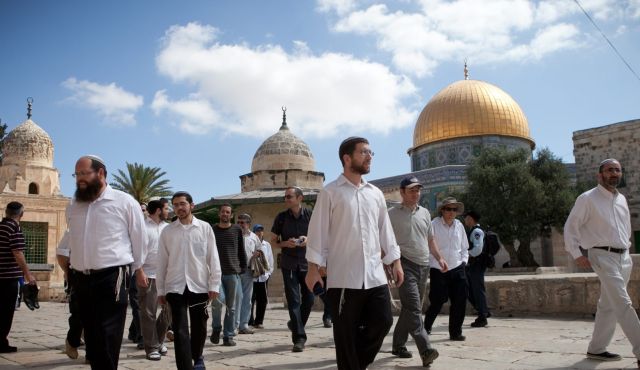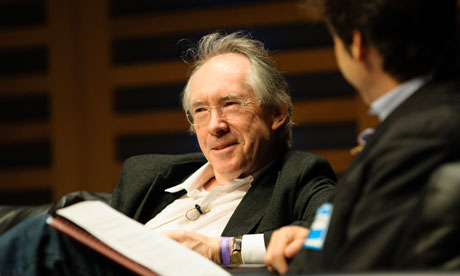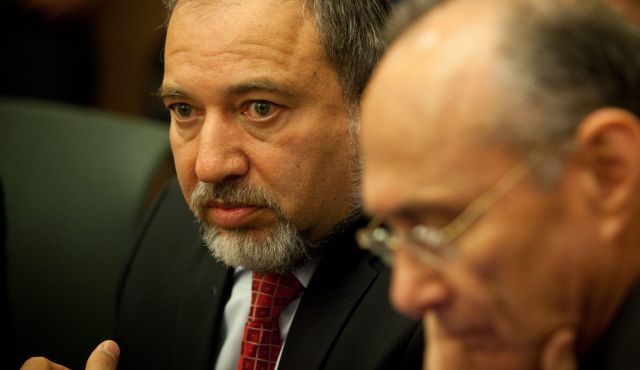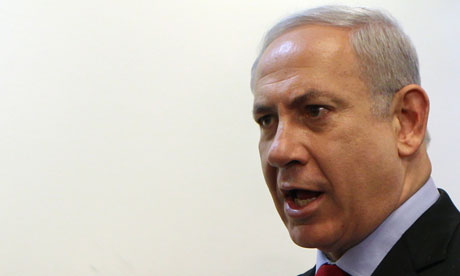EDITOR: Jerusalem Day is Occupation Day!
Jerusalem Day is a constant reminder to all concerned about Israel’s unwillingness to come to a just and lasting peace in Palestine. Every year more of Jerusalem is confiscated, and every year more and more Palestinians loose their homes, land and civic rights. To pretend that this is some day of celebrating Jerusalem is facile – it is a day of celebrating apartheid, separation, occupation and oppression. It will always be a day of attrition and hatred, to be exploited by the Israeli fascists.
Palestinian attacks IDF soldier during Jerusalem Day event in West Bank: Haaretz
Incident comes amid increased tensions in the capital over observance of Jerusalem Day; Israel Police stops right-wing MKs from leading prayers on Temple Mount.
May.20, 2012

A Palestinian man attempted to stab an IDF soldier securing a Jerusalem Day event near the Gush Etzion junction in the West Bank, Israel Radio reported on Sunday.
Preliminary reports indicated that the soldier, who was protecting a cycling trip organized to mark Jerusalem Day, was unharmed and that the assailant was seriously wounded in the struggle to subdue him.
The incident took place as large police and military police forces were deployed across the capital in preparation for possible confrontations between East Jerusalem residents and right-wing marchers marking Jerusalem Day.
Earlier Sunday, as part of Jerusalem Day events, National Union MKs Uri Ariel and Michael Ben-Ari arrived at the Temple Mount accompanied by a group of about 20 right-wing activists to conduct a tour of the site.
Originally, Ariel and Ben-Ari were supposed to be joined by fellow National Union MK Aryeh Eldad, along with Ze’ev Elkin (Likud) and Otniel Schneller (Kadima), who all cancelled at the last moment.
During the tour, four or five of the activists, including Ben-Ari himself, kneeled to pray on the Temple Mount, with a nearby police force preventing them from doing so.
However, as a result of the questioning of two the group’s participants following the act, the tour’s leader, Yehuda Eztion, a one-time member of the Gush Emunim Underground, sat on the ground and refused to move on.
He was then forcibly removed by police and arrested, with MK Ben-Ari confronting police officers to try and prevent the arrest.
A Jerusalem you don’t know about: Haaretz
It’s a good thing there’s Jerusalem Day, so we’ll remember there’s another Jerusalem next door. Shalom and salaam to you, Jerusalem.
By Mohammed Aweida
I want to tell you about my Jerusalem, a Jerusalem you don’t know about. You’re unfamiliar with East Jerusalem, with its many villages, because you’ve never visited. You even changed the names of those villages. Silwan, the village where I was born and where I still live, became the village of Shiloah. A-Tur became the Mount of Olives. Jabal Mukkaber became Armon Hanatziv.
It pains me to have to describe to you a place you’ve often been only 100 meters from. And even if you’ve been there, you may not have believed it was Jerusalem. My Jerusalem is villages in ruins, with ugly construction, without infrastructure and without security. In my Jerusalem there aren’t enough schools, there’s no childhood and no adulthood (or matriculation ). It makes no difference which village you’ve entered, the picture is identical everywhere in the city where no Jews live.
Community centers? There they don’t know what that means. Bomb shelters? There’s a shelter in Abu Tor, but they turned it into a girls’ school because they have nowhere to study. Infrastructure? What a difference between us and the western part of the city. We pay the taxes of an Israeli city, but it feels like we’re living in a Palestinian refugee camp. “An integral part of Greater Jerusalem,” say populist politicians about East Jerusalem. It would be more accurate to say: “An integral part of Greater Jerusalem’s tax collection system.”
What characterizes my Jerusalem, what makes it so ugly, is illegal construction. Some will say this is due to disdain for the law or even hostility. But from experience I know we don’t receive even 1 percent of the construction permits they receive in the west of the city.
We once tried to be like you – Israelis, modern and law-abiding. Two villages, Isawiyah and A-Tur, got together and submitted a construction plan for young couples on a large plot of land between the two villages. But the municipality said the area was too beautiful for houses; it would be the site of a public park for united and beautiful Jerusalem. And where will the young couples live? Find another place, said the municipality. If you don’t find one, continue to build illegally and we’ll know how to deal with you.
That’s one example from two villages. There are more. In my activities in the movement Fighting for Peace, I meet many Israelis. Almost always, someone asks the naive question: “But why is there hatred between us?” or “Why do the Arabs always complain?” or “Why give you things if you’re never satisfied?” My answer is that if we didn’t see from afar how you live and how you’re building, maybe we wouldn’t be envious. But when no border separates us, only a highway, and when the differences are so blatant, no propaganda machine can erase them.
And now, as in each of the past 45 years, Jerusalem is filling up with flags and excitement. The right-wing parade, which is devoted entirely to incitement and provocation, enters the eastern part of the city. And I ask myself, how do the Israelis feel that Jerusalem is united? A place where I feel foreign and unwanted, a place that doesn’t look at all like somewhere I’d want to live – such a place can’t be called “mine.”
It’s a good thing there’s Jerusalem Day, so we’ll remember there’s another Jerusalem next door. Shalom and salaam to you, Jerusalem.
The writer is a resident of Jerusalem’s Silwan neighborhood.
Ian McEwan: misery of attack on Iran would be beyond belief: Guardian
Author says regime is ‘looking very wobbly,’ but that an attack would reunite the country behind its leaders
Lisa Allardice
Ian McEwan, the writer whose 2005 novel Saturday was widely interpreted as making the case for military intervention in Iraq, said on Sunday any attack on Iran with the aim of destroying its nuclear capability would end in disaster.

Speaking at the Guardian’s Open Weekend festival, McEwan said: “I belong to that very large cohort who think it would be absolutely disastrous to attack Iran … I think the mischief and misery and unintended consequences of an attack on Iran would be beyond belief.”
McEwan’s Saturday is set on 15 February 2003, the day of a huge anti-war demonstration in London. He said the debate over intervention in Iran mirrored the arguments over Iraq in 2003, but said that readers were wrong to attribute to him the pro-war views of Saturday’s neurosurgeon hero, Henry Perowne.
In fact, McEwan said, his views on Iraq were a combination of Perowne’s and those of his anti-war daughter, Daisy. Although he sympathised initially with arguments that Saddam Hussein had to be removed from power, he became “deeply convinced” that the Bush administration was not capable of running the country following a conflict.
As the invasion loomed, McEwan said he spent a “white night of complete sleeplessness” hatching a plan to personally persuade Tony Blair to move 10,000 British troops from Kuwait to Afghanistan. He planned to ask his publisher, Gail Rebuck, to set up a meeting with the prime minister through her husband, Blair’s pollster Phillip Gould, but thought better of it in the morning.
McEwan said the Iranian regime was now “looking very wobbly” with “real splits between Ahmadinejad and the supreme leader Khamenei” – but any attack on the country would “bind the country back together behind the theocracy”.
He also rejected Israeli claims that if military action were not taken against the Iranian nuclear programme within months, Tehran’s weapons capability would be secreted away underground in facilities where it could no longer be knocked out.
“I wish that Israel had never embarked on [its own nuclear weapons programme] because it was inevitable that one or other of the powers in the region would follow … [but] There is a massive feeling of resentment against the [Iranian] regime, within the population and it’s quite a sophisticated population, to drive them to the other side would be a disaster.
During the interview, with the Guardian’s deputy editor, Ian Katz, the novelist also said:
• The British education system is limiting children in forcing them to choose between humanities or scientific studies at an early age. He said the American GRE test for postgraduate entrants produced more rounded students.
• When he was introduced to Tony Blair at a Tate Modern function, “the prime minister got hold of my hand in that intense way politicians have, not letting it go, and said: ‘I’m a great admirer of your work. We have a couple of your pictures hanging in Downing Street.'” He included the anecdote in Saturday.
• His son had to study his novel Enduring Love for A-level. McEwan had given him “some key points” but he still got a low mark – “I think quite wrongly. His tutor thought the stalker carried the authorial moral centre. Whereas I thought he was a complete madman.”
McEwan also revealed that he wrote notes for his novels initially in longhand, in ringbound green notebooks, working on a table he built himself in the 90s. “Black ink always. Pressing medium hard,” he joked.
Austria minister: Lieberman’s presence in Israeli cabinet ‘unbearable’: Guardian
In an interview to Die Presse daily, Norbert Darabos says Israel directing attention at enemies such as Iran, Palestinians in order to avoid internal social issues.

Austrian Defense Minister Norbert Darabos has launched an unprecedented verbal assault against Foreign Minister Avigdor Lieberman, saying in an interview due to be published on Sunday that his presence in Israel’s cabinet was “unbearable.”
In an interview to the Austrian daily Die Presse, Darabos severely criticized Israel’s policies, with a special emphasis on continued settlement activity and the nuclear standoff with Iran.
“Iran can’t build a bomb yet, and Israel’s threats are unnecessary,” he said, adding that he felt an attack on “Iran’s nuclear facilities would spark an uncontrollable fire in the region and will create solidarity and empathy for Iran in the Arab world and the world at large.”
The Austrian minister accused Israel of “pointing a finger at its foreign enemies like Iran and the Palestinians in order to avoid dealing with internal social issues,” adding that, “honestly, the fact that minister Lieberman is a member of the Israeli government is unbearable.”
“Israel was in a better place when there was a balance between the Labor party and conservative elements, but those times have passed as a result of a split in the left,” he added.
Earlier this month, Lieberman urged Prime Minister Benjamin Netanyahu’s cabinet to advance High Court-bypassing legislation to sanction illegal West Bank outposts such as the Ulpana Hill neighborhood of Beit El.
Lieberman made the comment a few days after the High Court of Justice gave the government 60 days to demolish houses in the neighborhood that were illegally built on private Palestinian land.
Lieberman said that Ulpana is “not an illegal outpost. The state made a mistake. [Ulpana residents] did not make a mistake, they were sent there. The state made a mistake and it should take responsibility. I see no other way than legislation that will solve the issue.”
EDITOR: Not enough criminals are black…
Well it seems that there are some differences between the migrants and Jewish Israelis: they are too black, they are too law-abiding, and they are not Jewish enough… Hitler would have loved this.
Israel PM: illegal African immigrants threaten identity of Jewish state: Guardian
Binyamin Netanyahu reignites row over fate of thousands of African migrants in Israel
Harriet Sherwood in Jerusalem

The Israeli prime minister has stoked a volatile debate about refugees and migrant workers from Africa, warning that “illegal infiltrators flooding the country” were threatening the security and identity of the Jewish state.
“If we don’t stop their entry, the problem that currently stands at 60,000 could grow to 600,000, and that threatens our existence as a Jewish and democratic state,” Binyamin Netanyahu said at Sunday’s cabinet meeting. “This phenomenon is very grave and threatens the social fabric of society, our national security and our national identity.” Israel’s population is 7.8 million.
His comments follow media reports of rising crime, including two gang rapes, in southern Tel Aviv, where many African migrants are concentrated. However, Micky Rosenfeld, spokesman for the Israeli police, said the overall crime rate in Israel had fallen. There had been one alleged rape of a teenage girl connected to the migrant community, for which three suspects were in custody, he added.
Yohanan Danino, the Israeli police chief, said migrants should be permitted to work to discourage petty crime. Nearly all are unable to work legally, and live in overcrowded and impoverished conditions. “The community needs to be supported in order to prevent economic and social problems,” said Rosenfeld.
But the interior minister, Eli Yishai, rejected such a move, saying: “Why should we provide them with jobs? I’m sick of the bleeding hearts, including politicians. Jobs would settle them here, they’ll make babies, and that offer will only result in hundreds of thousands more coming over here.”
Yishai repeated an earlier call for all migrants to be jailed pending deportation. “I want everyone to be able to walk the streets without fear or trepidation … The migrants are giving birth to hundreds of thousands, and the Zionist dream is dying,” he told Army Radio. Last week he said most migrants were involved in criminal activity.
According to police data quoted by the Hotline for Migrant Workers, the crime rate among foreigners in Israel was 2.04% in 2010, compared with 4.99% among Israelis.
More than 13,500 people entered Israel illegally in 2010, of whom almost two-thirds were Eritrean and one-third were Sudanese. Three were granted refugee status by Israel, rising to six last year. Human rights organisations say more than 50,000 asylum seekers and migrants have entered Israel illegally since 2005.
Most are smuggled across the Israel-Egypt border by Bedouin tribesmen. Israel is constructing a vast steel fence through 150 miles of the Sinai desert as a deterrent to people-trafficking and the smuggling of drugs and weapons. The barrier would be completed, bar one small section, by October, Netanyahu said.
Israel is also constructing the world’s largest detention centre for asylum seekers and illegal migrants, capable of holding 11,000 people. The £58m building, close to the border, will receive its first detainees by the end of the year.
Netanyahu said the state would embark on “the physical withdrawal” of migrants, despite fears among human rights organisations about the dangers they could face in their home countries. Yishai said: “I’m not responsible for what happens in Eritrea and Sudan, the UN is.”
As tensions rise in cities with relatively high African populations, the past month has seen a spate of attacks on buildings in south Tel Aviv that house asylum seekers and migrant workers. In one incident, a Molotov cocktail was thrown into the courtyard of a kindergarten. NGOs working with migrants have also received abusive and threatening calls.
Amid the anti-immigration clamour, some Israelis have argued that, in the light of Jewish history, their state should be sympathetic and welcoming to those fleeing persecution.